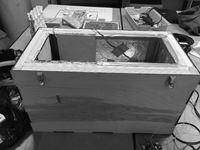Development of a Simple Hot Box to Determine the Thermal Characteristics of Three-dimensional Printed Bricks

The objective of this research is to measure the thermal characteristics of the 3D printed wall and compare it with current construction assemblies.
With the promise to simplify construction, lower cost, increase speed and responsible use of natural resources, encourage recycled material use, and increase design flexibility, parametrized 3D printing represents a credible alternative to current construction practices. To date, the focus of research has been on printing techniques, materials, and structural performance, but many of the promised benefits and opportunities have remained largely unrealized. One of the topics that has received little attention is the study of the thermal performance of the 3D printed walls and envelope components.
This paper describes the design and application of a small Hot Box Apparatus developed specifically to test the thermal performance of small and highly detailed samples produced in the researchers’ labs. The researchers discuss the testing procedures, the instrumentation, and the conditions of the tests. The discussion includes errors encountered and elaborates on their sources and how they addressed them in the two experiments that are the basis of this paper.
The results revealed that the obtained values from the hotbox were within the acceptable margin of error found in similar laboratory tests. Data collected from testing a rigid polystyrene board of known thermal characteristics were used to estimate parameters used in the determination of the thermal resistivity (R-value) of the ceramic wall. Initial results were promising because of the ability to embed different shapes and sizes of air pockets in the wall. Recommendations include improving the performance of the Hot Box and instrumentation to increase the accuracy of the measurements.
keywords: Hot Box, Conduction, 3D Printing, Thermal Performance, Ceramic wall


Add comment
Log in to post comments